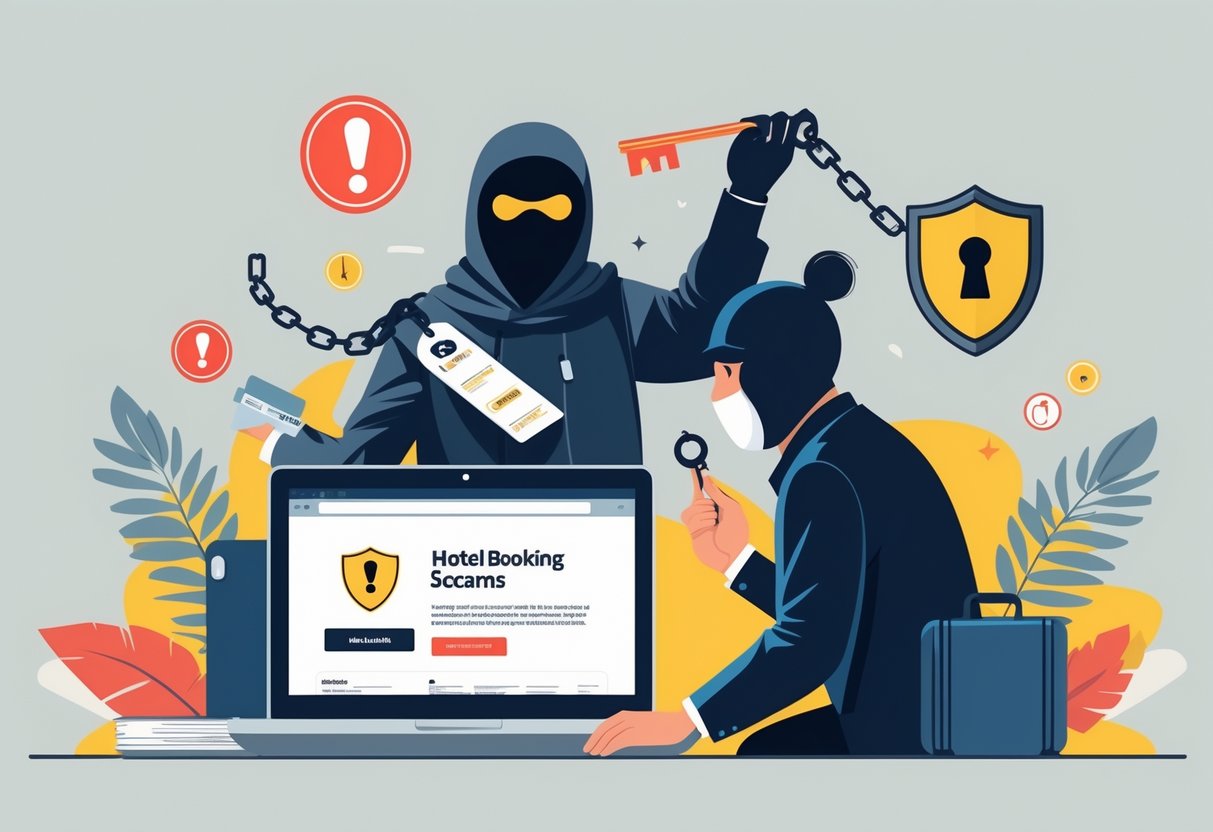
Types of Hotel Booking Scams
Travelers face a range of risks when booking hotels online, including fake websites, phishing attacks, and deceptive vacation rental listings. Recognizing these threats early can help individuals avoid losing money or having their trip disrupted.
Fake Booking Websites
Fraudulent booking sites often impersonate reputable hotels or major travel platforms. These websites can look professional, displaying logos, reviews, and even fake confirmation numbers.
After making a reservation, victims may find that their payment went to scammers, with no real booking in place. Warning signs of a fake hotel scam site include requests for payment by wire transfer or prepaid cards.
Inconsistent contact information, poor grammar, and unusual web addresses are also indicators. Users should confirm they are on a legitimate site before entering payment details.
A legitimate hotel website will use secure encryption (look for “https” and a lock symbol). Travelers should find the hotel’s contact number independently and confirm the booking.
More details about hotel scams and how to prevent them can help travelers recognize risky sites.
Phishing Scams
Phishing scams target travelers by sending fake emails, texts, or calls that appear to come from hotel chains or travel agencies. These messages often urge recipients to click on spoofed links to “confirm” booking information or update payment details.
Key features of phishing scams include urgent language, threats of canceled reservations, and requests for personal or financial data. Often, the emails or websites will contain slight misspellings or incorrect branding.
To avoid falling for phishing, travelers should not click on suspicious links or download attachments from unexpected messages. Instead, they should contact the hotel or booking platform directly using official channels.
Consumer advice from the FTC emphasizes the importance of directly verifying any requests related to booking information.
Vacation Rental Scams
Vacation rental scams typically involve fake listings on popular platforms or standalone sites that offer deals that seem too good to be true. Scammers may steal real photos and details from legitimate properties, then instruct victims to send deposits outside the official platform.
Common signs include pressure to pay upfront, refusal to use secure payment methods, and a lack of verifiable reviews. Some listings disappear after payment, and renters arrive to find the property doesn’t exist or is already occupied.
Travelers should book only through trusted vacation rental platforms and avoid direct bank transfers. Checking reviews and independently verifying property details can help defend against these vacation rental scams.
If a deal feels questionable, it is best to walk away.
Risks Involved in Falling for Scams

Falling for hotel booking scams can compromise financial stability and personal safety. Victims risk losing both money and sensitive personal information, which can lead to greater damage than just canceled travel plans.
Financial Losses
When travelers are ensnared by hotel booking scams, they often face immediate and sometimes substantial financial losses. Scammers may ask for payment through insecure methods such as wire transfers or prepaid cards, making recovery of funds nearly impossible.
Traditional protections like credit card chargebacks may not apply if payments occur outside secure booking channels. Victims may pay inflated “booking fees,” service charges, or even deposits for rooms that do not exist.
In some cases, entire vacation budgets disappear, leaving travelers stranded upon arrival with no accommodations. Checking the legitimacy of booking websites and keeping transactions on trusted platforms is crucial, as outlined in guidance on avoiding hotel room booking scams.
Identity Theft
Scam hotel websites often mimic legitimate platforms, tricking users into submitting sensitive data. This typically includes names, addresses, phone numbers, and full payment card details.
Once obtained, scammers may use or sell this personal and financial information for various malicious purposes. Data breaches from these fake booking systems can trigger long-term consequences, such as unauthorized charges, phishing attempts, or the opening of fraudulent accounts under the victim’s name.
It is not just the immediate transaction at risk—there can be ripple effects on one’s credit, digital security, and ongoing fraud protection. Constant monitoring and use of secure, reputable booking channels help mitigate exposure to these threats.
Loss of Travel Investment
Even when the financial loss from the scam is limited to a single transaction, travelers frequently lose their entire travel investment. Fake bookings often result in arriving at a hotel that has no record of the reservation, forcing travelers to pay again—sometimes at higher walk-in rates—or find alternative, potentially costlier, lodging on short notice.
Additional losses can include non-refundable transportation, tickets, or tour packages linked to the original booking. The trouble is compounded if reservations were tied to loyalty programs, as points or rewards may also be stolen or devalued, according to warnings about hotel booking scam risks.



